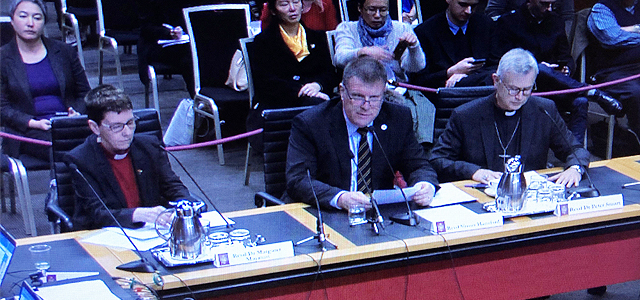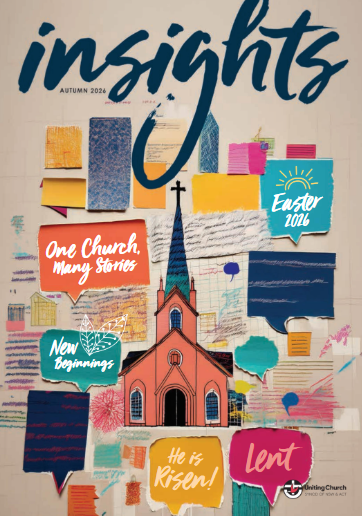On the 15 August, the Moderator Rev. Simon Hansford and Rev. Dr Margaret Mayman delivered their statements to NSW Parliamentary Inquiry into the Reproductive Health Care Reform Bill and reiterated the Uniting Church position for decriminalisation with the Rt Rev. Dr Peter Stuart, Bishop of Newcastle.
The legislation was introduced to the lower house last week and after several days of debate passed (with some amendments) with cross-party support in a conscience vote of 59 to 31.
The inquiry has been carried out by the Legislative Council Standing Committee on Social Issues and was established to inquire and report on the Reproductive Health Care Reform Bill 2019, over the two days statements from a broad cross-section of the community including the health care, religious and other organisations.
When addressing the inquiry, the Moderator reiterated the Uniting Church statement on the bill.
“When abortion is practised indiscriminately it damages respect for human life,” Rev. Hansford said.
“(But) the parliament resolving that this is not a criminal matter would open the health community and the wider community to better care, better support and better options for women and unborn children.”
Both Rev. Hansford and Rev. Mayman reiterated the anachronistic nature of the bill and that it should be removed from the Crimes Act of 1900, saying that it no longer was in step with women’s rights and agency.
Rev Dr Mayman, who is a lecturer in Theological Ethics at United Theological College (Charles Sturt University) said NSW’s abortion laws were instituted during a time when it was deemed appropriate for women’s bodies and sexuality to be controlled by “patriarchal power”. “That’s a shameful part of our history,” she told the hearing.
“We need to be aware that the anachronism of locating abortion in the criminal code,” Rev. Dr Mayman said.
“Also what was happening in this time was the rise of the eugenics movement, and a concern about decreasing fertility among white women and a desire to regulate that. This is a shameful part of our history and this need to be understood in the context of how this legislation came about. That’s not the view we want to hold in Australian society when we do regard equality on the basis of gender as the core of who we are as a people.”
This sentiment was reiterated by Edwina MacDonald, a Legal Director at the Human Rights Law Centre on 14 August, who said it is unacceptable that abortion is still an offence under NSW law.
“The current laws are archaic and change is long overdue. It is unacceptable that, in 2019, women still fear prosecution when accessing an abortion and we are still treated like we are incapable of making decisions about our bodies and lives.
“Passing this Bill will demonstrate that the NSW Parliament respects women as competent decision-makers over their bodies and that it is committed to women’s health, safety and equality.”
The inquiry will report back to the Upper House next Tuesday, and a vote is expected later next week.







3 thoughts on “Uniting Church addresses Inquiry into Reproductive Health Care Reform Bill 2019”
I am stunned that the Uniting Church is for the new abortion laws. How can any church endorse the killing of babies under any circumstance. This is beyond belief. I have been a leader in the UC for many years. Please killing babies is not God’ Will.
An inquiry like this sounds more like a means to gain approval for widespread abortion!!!!
Thank you for your comments, the inquiry was actually called so there was more reasoned debate on the bill and what is contained in it. We suggest you read the Uniting Church initial statement to MPs https://www.insights.uca.org.au/news/an-open-letter-to-members-of-the-nsw-parliament-regarding-the-reproductive-health-care-reform-bill-2019
This is a view that has been held by the UCA for two decades and references two previous statements (in 1992 and 2004) on the issue.